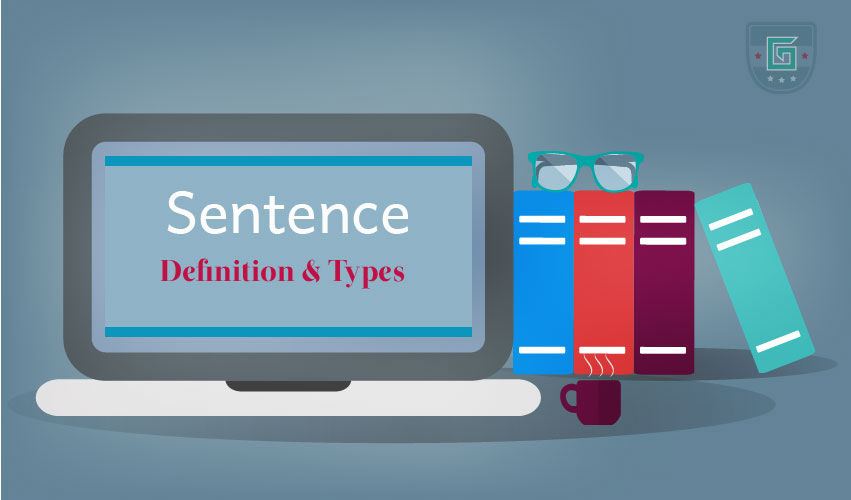6th Grade Language Arts Grammar and Usage Definition of Sentence

Asentence is the largest unit of any linguistic communication. In English, information technology begins with a capital letter letter of the alphabet and ends with a full-stop, or a question mark, or an exclamation marker.
The sentence is generally divers as a word or a group of words that expresses a thorough thought by giving a statement/order, or asking a question, or exclaiming.
Example:
He is a good male child (statement), Is he a good boy? (question), What a nice weather! (exclaiming).
Ideally, a sentence requires at to the lowest degree ane field of study and 1 verb. Sometimes the field of study of a sentence tin can be hidden, just the verb must be visible and present in the sentence. Verb is called the middle of a sentence.
Instance:
Do it. (In this sentence, a subject 'you' is hidden but verb 'do' is visible)
"[A sentence is] a grouping of words, ordinarily containing a verb, that expresses a thought in the class of a argument, question, instruction, or exclamation and starts with a uppercase letter when written." - (Cambridge Advanced Learner's Dictionary & Thesaurus © Cambridge University Press.)
More Examples of Sentences
In other words, a complete English sentence must have three characteristics:
- Showtime, in written form, a sentence begins with a upper-case letter and ends with a period (i.e., a full end) [.], a note of interrogation (i.e., a question mark) [?], or a note of assertion (i.e., an exclamation marker) [!].
- Second, information technology must express a complete idea, not fragmented.
- Tertiary, it must contain at least one subject (subconscious/visible) and i verb comprising an independent clause. (An contained clause contains an independent subject and verb and expresses a complete thought.)
Types of Sentences
Structurally, sentences are of four types:
- Simple sentence
- Chemical compound sentence
- Complex sentence, and
- Compound-circuitous sentence.
Unproblematic judgement
Aelementary sentence must have a single clause (a single verb) which is contained, and information technology cannot take another clause.
Example:
I always wanted to become a writer. (One clause – one verb)
Compound sentence
Acompound judgement must have more than one contained clause with no dependent clauses. Some specific conjunctions, punctuation, or both are used to join together these clauses.
Example:
I always wanted to become a writer, and she wanted to become a doctor. (2 contained clauses – two verbs)
Complex judgement
Acomplex judgement also has more than one clause but of one them must be an contained clause and the other/others must be (a) dependent clause(es). There are besides some detail connectors for the clauses of a complex sentence to be connected.
Example:
I know that you ever wanted to be a writer. (Here, a dependent clause is followed by a connector and an independent clause. The other way around is too possible.)
More Complex Sentence Examples
Compound-complex sentence
Achemical compound-complex sentence (orcomplex–compound judgement) is a mixture of the features of compound and complex sentences in one sentence. Then, information technology must comprise at least two independent clauses and at least one dependent clause.
Instance:
I know that you always wanted to become a writer, merely I always wanted to become a doc. (Here, one dependent clause is followed by a circuitous connector and ii contained clauses with a compound conjunction between them.)
Functionally, sentences are of mainly four types:
- Declarative sentence
- Imperative sentence
- Interrogative sentence, and
- Exclamatory sentence
Declarative sentence:
Anbelieving sentence (declarative sentence) simply expresses an opinion/feeling, or makes a argument, or describes things. In other words, it declares something. This type of sentence ends with a period (i.e., a full-stop).
Examples:
- I want to be a adept cricketer. (a statement)
- I am very happy today. (a feeling)
More Examples of Declarative Sentence
Imperative sentence:
We apply an imperative judgement to make a asking or to give a command. Imperative sentences commonly finish with a period (i.eastward., a full stop), just nether certain circumstances, information technology can finish with a note of exclamation (i.eastward., exclamation mark).
Examples:
- Please sit.
- I need you to sit down downwardly now!
More Examples of Imperative Judgement
Interrogative sentence:
Aninterrogative sentence asks a question. Interrogative sentences must end with a note of interrogation (i.e., question marker)
Examples:
- When are you going to submit your consignment?
- Practise you know him?
More Examples of Interrogative Judgement
Exclamatory sentence.
Anexclamatory sentence expresses overflow of emotions. These emotions can be of happiness, wonder, sorrow, anger, etc.
Examples:
- What a day it was!
- I cannot believe he would exercise that!
More Examples of Exclamatory Sentence
Source: https://www.learngrammar.net/english-grammar/sentence-definition-n-types
0 Response to "6th Grade Language Arts Grammar and Usage Definition of Sentence"
Post a Comment